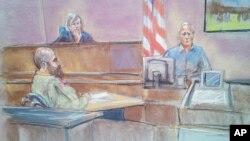HOUSTON —
Prosecutors in the trial of accused Fort Hood shooter Major Nidal Hasan rested their case Tuesday after presenting 89 witnesses and a large amount of technical evidence over the past weeks. It is now time for the accused, who is representing himself, to call witnesses and present his case.
After presenting their last witness in the case against Major Hasan, military prosecutors rested and presiding Judge Colonel Tara Osborn set Wednesday for the defense to begin presenting its case. Hasan is accused of murdering 12 soldiers and a civilian and wounding more than 30 others during a shooting rampage at the army base on November 9, 2009.
Jeffrey Addicott, a military law expert at the Center for Terrorism Law at St. Mary's University in San Antonio, says the prosecution presented a complete picture of how Hasan planned the attack, how it was carried out, and the horrific results in terms of people wounded and killed.
"The prosecution put on a strong case," he said. "They have put on scores of witnesses, they covered their bases from A to Z, they have proven that he is the individual who killed the victims and wounded the other victims."
Since Hasan is representing himself, he will be able to call and question witnesses and present any other evidence he has on Wednesday. Judge Osborn ruled earlier that he cannot argue that the murder was justified in order to protect others, namely, the Taliban and Islamic radical fighters in Afghanistan or Iraq. But Addicott believes, based on statements Hasan made earlier, that he himself will take the stand and admit to the crime.
"He is going to take full responsibility and full credit, if you will, because in his mind what he did was justified," he said. "Now, the judge will not allow him to raise 'defense of others' as a defense, but she cannot stop him from talking about why he did it."
Addicott says that if Hasan does this he will then open the way for prosecutors to ask in cross examination about his jihad motive, something the judge had not allowed them to mention during their presentation of evidence.
"They will be able to ask him those questions, because once he takes the stand and opens that door then it is fair game," he said.
Over the past two weeks Hasan has remained mostly silent, asking few questions of prosecution witnesses. This sped up the proceedings and allowed prosecutors to wrap up sooner than had been expected. Hasan has indicated he only expects to call two witnesses, so Jeffrey Addicott says the closing arguments could come as early as Thursday, with the case then going to the jury, known in military law as the panel. He says they could have a verdict by early next week and then the trial could move to the punishment phase in which panel members would determine whether to apply the death penalty.
After presenting their last witness in the case against Major Hasan, military prosecutors rested and presiding Judge Colonel Tara Osborn set Wednesday for the defense to begin presenting its case. Hasan is accused of murdering 12 soldiers and a civilian and wounding more than 30 others during a shooting rampage at the army base on November 9, 2009.
Jeffrey Addicott, a military law expert at the Center for Terrorism Law at St. Mary's University in San Antonio, says the prosecution presented a complete picture of how Hasan planned the attack, how it was carried out, and the horrific results in terms of people wounded and killed.
"The prosecution put on a strong case," he said. "They have put on scores of witnesses, they covered their bases from A to Z, they have proven that he is the individual who killed the victims and wounded the other victims."
Since Hasan is representing himself, he will be able to call and question witnesses and present any other evidence he has on Wednesday. Judge Osborn ruled earlier that he cannot argue that the murder was justified in order to protect others, namely, the Taliban and Islamic radical fighters in Afghanistan or Iraq. But Addicott believes, based on statements Hasan made earlier, that he himself will take the stand and admit to the crime.
"He is going to take full responsibility and full credit, if you will, because in his mind what he did was justified," he said. "Now, the judge will not allow him to raise 'defense of others' as a defense, but she cannot stop him from talking about why he did it."
Addicott says that if Hasan does this he will then open the way for prosecutors to ask in cross examination about his jihad motive, something the judge had not allowed them to mention during their presentation of evidence.
"They will be able to ask him those questions, because once he takes the stand and opens that door then it is fair game," he said.
Over the past two weeks Hasan has remained mostly silent, asking few questions of prosecution witnesses. This sped up the proceedings and allowed prosecutors to wrap up sooner than had been expected. Hasan has indicated he only expects to call two witnesses, so Jeffrey Addicott says the closing arguments could come as early as Thursday, with the case then going to the jury, known in military law as the panel. He says they could have a verdict by early next week and then the trial could move to the punishment phase in which panel members would determine whether to apply the death penalty.









